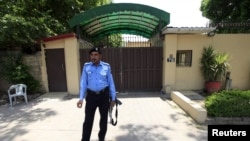Pakistan has accused Save the Children of working “against its agenda and charter” inside the country.
“We will not allow anyone to work under the table,” Interior Minister Chaudhry Nisar Ali Khan said in a press briefing Friday. “We will not allow any NGO to work in this country against Pakistan’s interests, culture and values.”
He also accused some local NGOs, without naming any, of “taking foreign funding to work on a foreign agenda.”
Khan said that some international NGOs had, for years, been flouting the country’s laws and regulations under which they were registered.
“We welcome NGOs that are doing good work, but they will have to respect Pakistan’s laws and regulations,” Khan said.
A day before, the government had closed and sealed the offices of Save the Children in the capital, Islamabad, ordering the group to wind up its operations in the country and send away all foreign staff within 15 days.
Aid group rejects allegations
Save the Children strongly denied accusations of wrongdoing and said the government’s action came as a shock.
“We’ve got nothing to do with ulterior agendas or any other strategic agendas,” said Saeed Ahmed, media focal person for Pakistan.
“All our work is designed and delivered in close collaboration with the government ministries across the country, and aims to strengthen public service delivery systems in health, nutrition, education and child welfare,” a statement issued by the aid group said.
Aid group scrutinized after bin Laden raid
The international NGO has operated in the country for more than 35 years. It first ran into trouble after a U.S. raid inside Pakistan that killed Osama bin Laden in 2011. A Pakistani intelligence report said Save the Children had ties to Shakil Afridi, the Pakistani doctor allegedly recruited by the CIA to help find bin Laden. The organization has denied any links to the doctor.
All of the agency’s foreign staff was ordered out of the country soon after. Save the Children has always denied it had any links with Afridi or the CIA but Pakistan has since been suspicious of international aid groups as covers for espionage.
US Reacts
The U.S. State Department said it was concerned by the developments regarding Save the Children.
"We are concerned about Pakistan's crackdown on international charitable organizations and other NGOs. Save the Children is one of many such organizations that has long operated with transparency in close coordination with the Government of Pakistan," said spokesman John Kirby.
In 2013, Pakistan began an effort to better manage and monitor international aid organizations. More than 150 groups received notices to register with the government.
Ahmed says Save the Children was “the first one to go into compliance.”
It requested a memorandum of understanding or MoU with the government but did not receive a decision. Instead, it was given interim permission to continue its work.
For the last year-and-a-half, the aid group has been working with an entirely local staff. Four months ago, it hired as its country director Farhana Farooqi, who was previously awarded a presidential award for “her relentless work during the earthquake of 2005” with another aid agency.
Ahmed said that for the last six months, Save the Children had been working with the relevant authorities “proactively” to provide them “information about our staffing, our operations, our accounts, our resources, our donor funding” as well as asking the government for any recommendations.
Working without permission
Unnamed government officials, however, accused the aid group of “anti-Pakistan” activities, according to reports in local media.
“Their activities were being monitored a long time. They were doing something which was against Pakistan's interest,” one such official told Pakistan’s English language daily Dawn.
During the press conference, the Interior minister also mentioned the cases of two other NGOs, one registered in Guinea, the other in Zambia, saying they were working in Pakistan “without permission” and focusing on the situation in Balochistan and Gilgit Baltistan.
He said they were making up “lies” against Pakistan and when their credentials were challenged in the United Nations Economic and Social Council, India, Israel and the United States defended them. Pakistan often accuses these three countries of conspiring against its interests.
National and international rights organizations have accused Pakistan’s intelligence agencies of human rights violations, particularly the policy of kidnapping and torture to try to stop dissent in the restive Balochistan province.
The country is highly sensitive to negative international coverage coming out of Balochistan.




